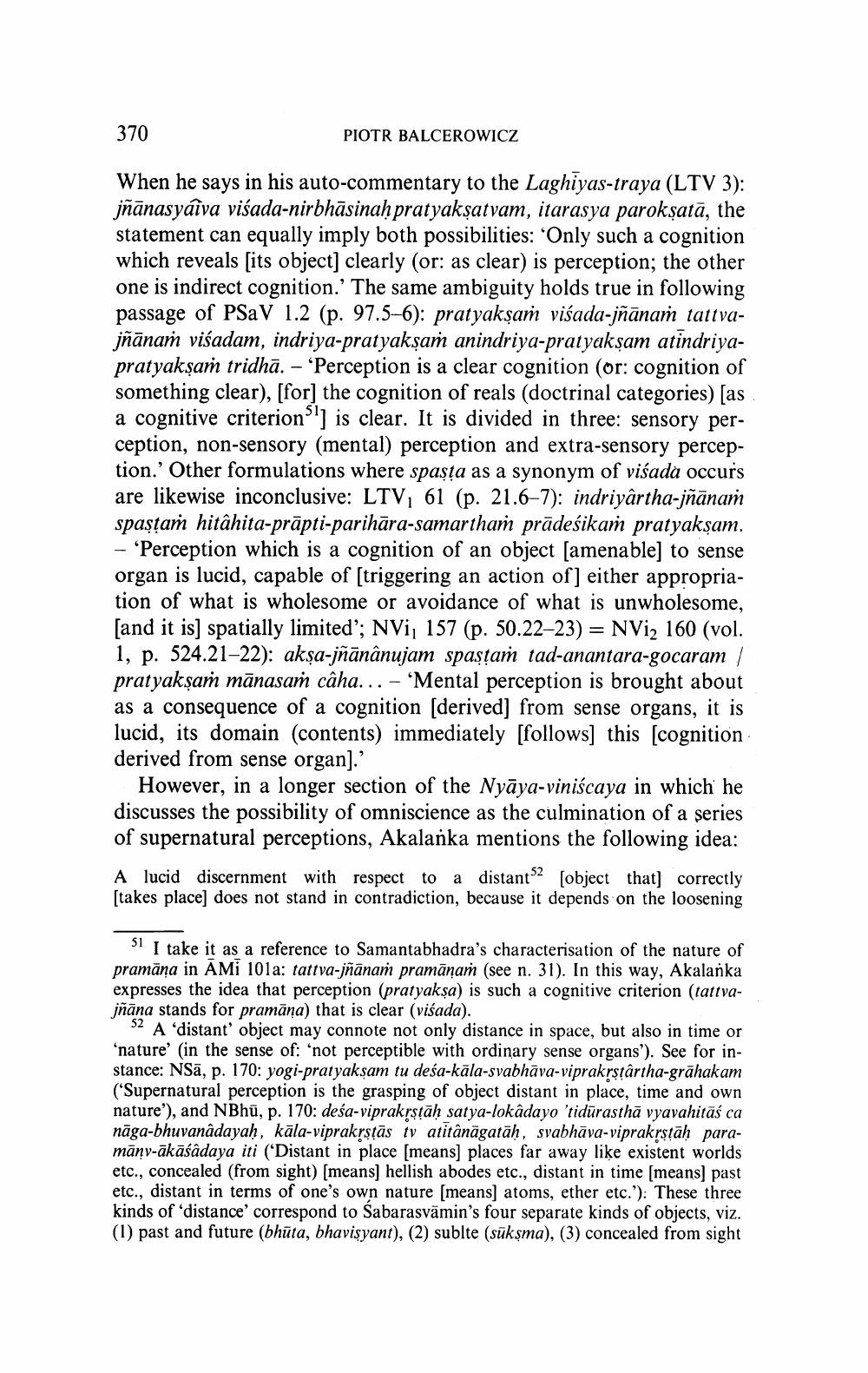________________
370
When he says in his auto-commentary to the Laghiyas-traya (LTV 3): jñānasyaîva viśada-nirbhāsinaḥ pratyakṣatvam, itarasya parokṣatā, the statement can equally imply both possibilities: 'Only such a cognition which reveals [its object] clearly (or: as clear) is perception; the other one is indirect cognition.' The same ambiguity holds true in following passage of PSaV 1.2 (p. 97.5-6): pratyakṣaṁ viśada-jñānaṁ tattvajñānam visadam, indriya-pratyakṣaṁ anindriya-pratyakṣam atīndriyapratyakṣam tridhā. - 'Perception is a clear cognition (or: cognition of something clear), [for] the cognition of reals (doctrinal categories) [as a cognitive criterion51] is clear. It is divided in three: sensory perception, non-sensory (mental) perception and extra-sensory perception.' Other formulations where spasta as a synonym of visada occurs are likewise inconclusive: LTV1 61 (p. 21.6-7): indriyârtha-jñānaṁ spaṣṭam hitâhita-prāpti-parihāra-samartham prādesikam pratyakşam.
PIOTR BALCEROWICZ
'Perception which is a cognition of an object [amenable] to sense organ is lucid, capable of [triggering an action of] either appropriation of what is wholesome or avoidance of what is unwholesome, [and it is] spatially limited'; NVi, 157 (p. 50.22-23) = NVi2 160 (vol. 1, p. 524.21-22): akṣa-jñānânujam spaṣṭam tad-anantara-gocaram | pratyakṣaṁ mānasaṁ câha... - 'Mental perception is brought about as a consequence of a cognition [derived] from sense organs, it is lucid, its domain (contents) immediately [follows] this [cognition derived from sense organ].'
However, in a longer section of the Nyāya-viniścaya in which he discusses the possibility of omniscience as the culmination of a series of supernatural perceptions, Akalanka mentions the following idea:
A lucid discernment with respect to a distant 52 [object that] correctly [takes place] does not stand in contradiction, because it depends on the loosening
51
I take it as a reference to Samantabhadra's characterisation of the nature of pramāna in AMi 101a: tattva-jñānam pramānam (see n. 31). In this way, Akalanka expresses the idea that perception (pratyakṣa) is such a cognitive criterion (tattvajñāna stands for pramāna) that is clear (visada).
52 A 'distant' object may connote not only distance in space, but also in time or 'nature' (in the sense of: 'not perceptible with ordinary sense organs'). See for instance: NSā, p. 170: yogi-pratyakṣam tu deśa-kala-svabhava-viprakṛṣṭartha-grahakam ('Supernatural perception is the grasping of object distant in place, time and own nature'), and NBhu, p. 170: deśa-viprakṛṣṭaḥ satya-lokâdayo 'tidurasthā vyavahitāś ca naga-bhuvanâdayaḥ, kala-viprakṛṣṭās tv atitânāgataḥ, svabhāva-viprakṛṣṭāḥ paramāṇy-ākāśâdaya iti ('Distant in place [means] places far away like existent worlds etc., concealed (from sight) [means] hellish abodes etc., distant in time [means] past etc., distant in terms of one's own nature [means] atoms, ether etc.'): These three kinds of 'distance' correspond to Sabarasvamin's four separate kinds of objects, viz. (1) past and future (bhūta, bhaviṣyant), (2) sublte (sūkṣma), (3) concealed from sight




